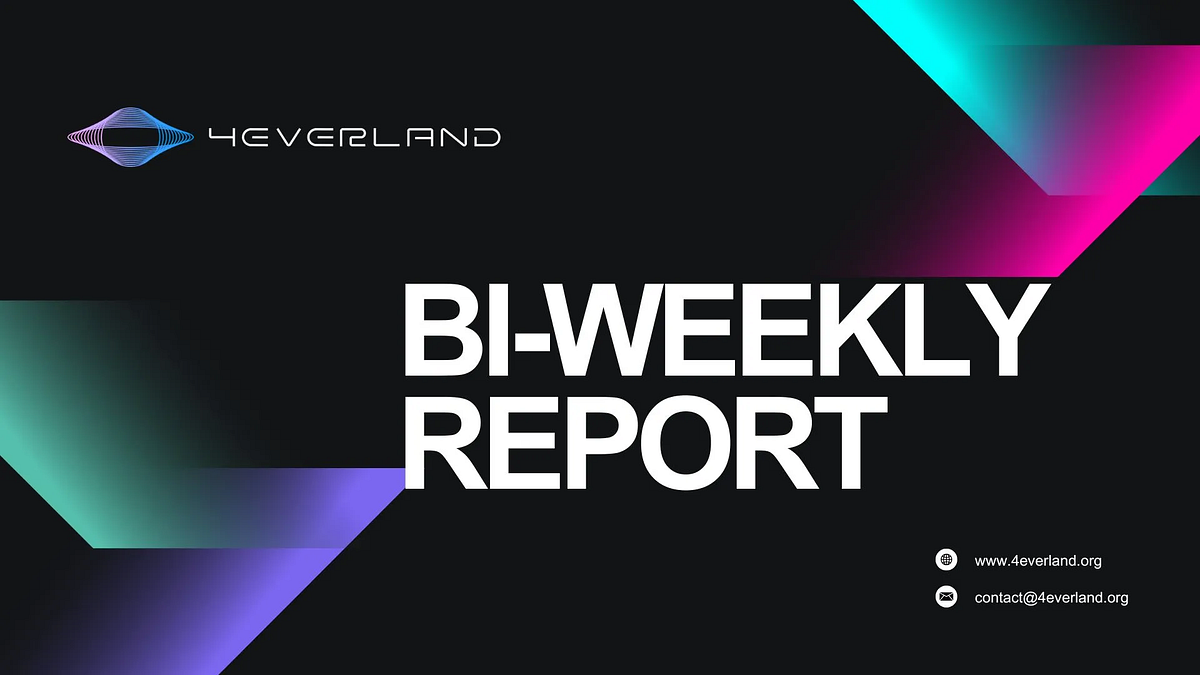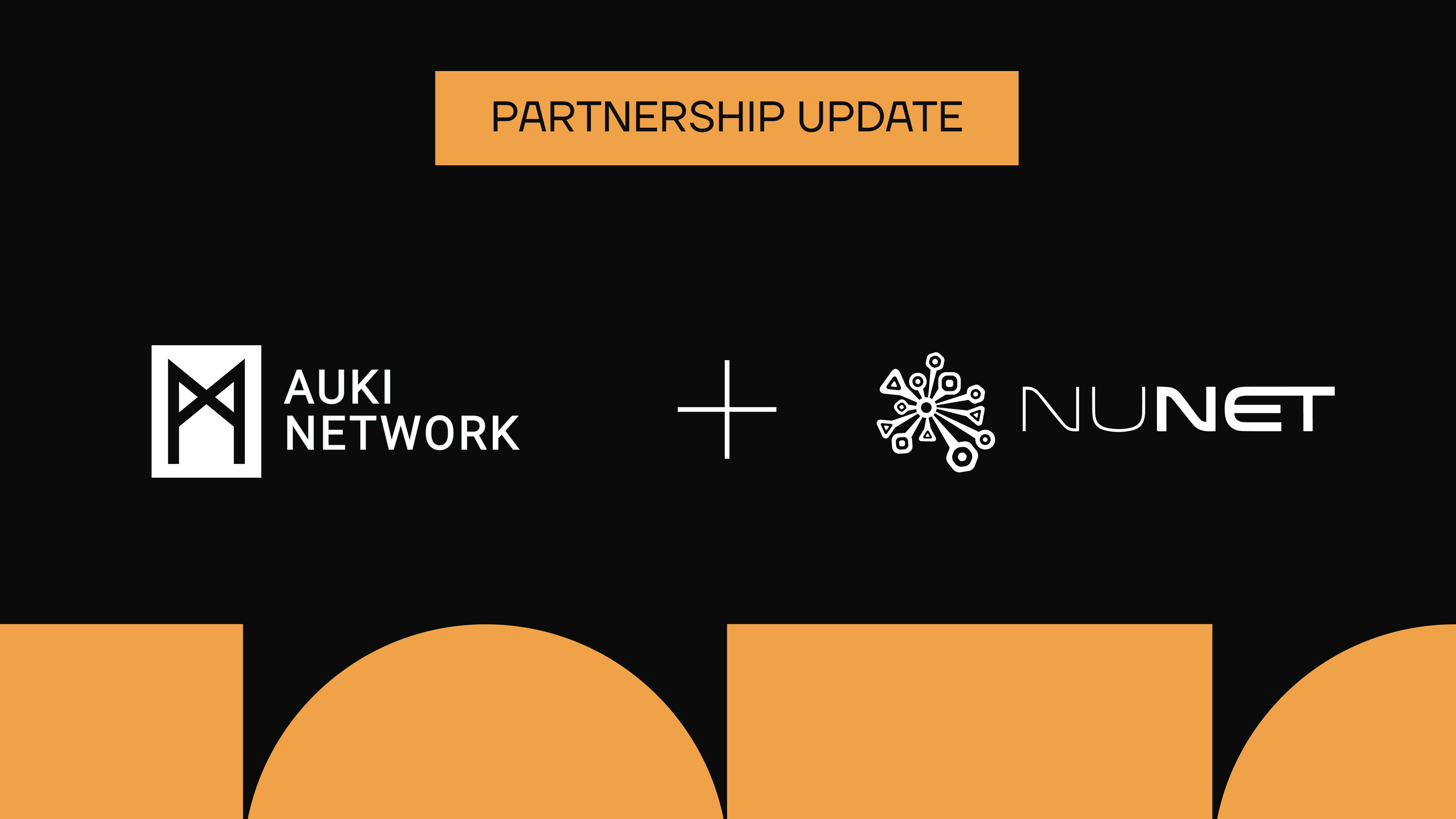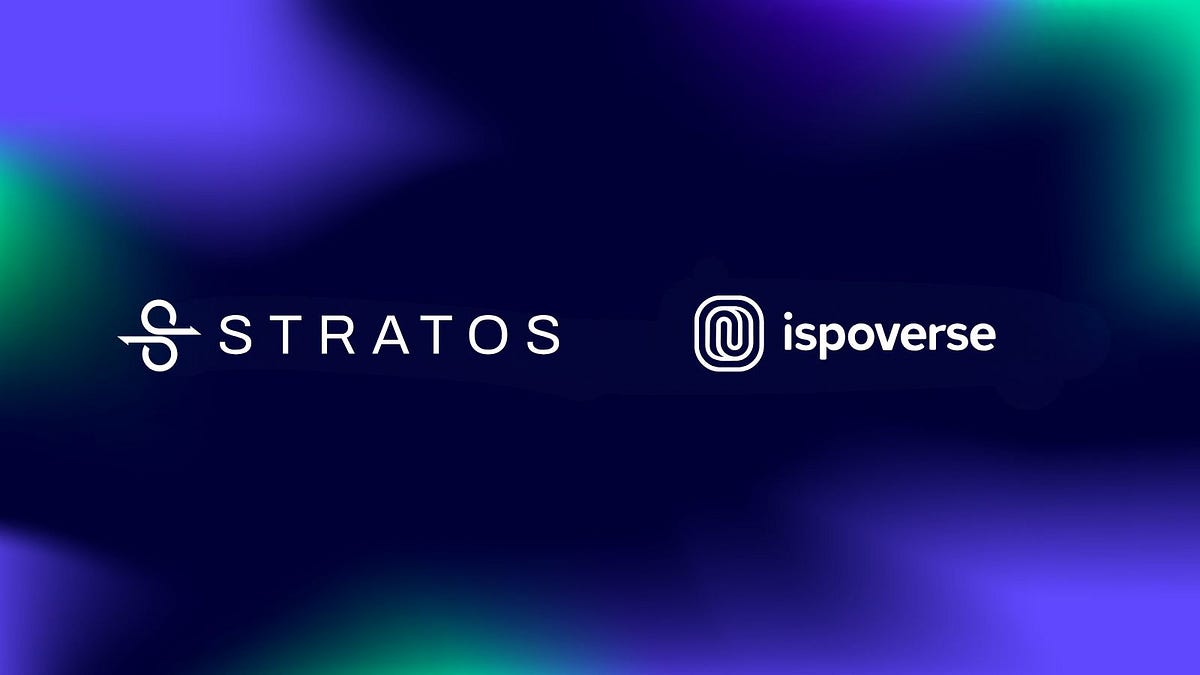Latest DePIN News

3 months ago
4EVERLAND Unveils New Innovations and Strengthens Community Engagement
### 4EVERLAND's Latest Innovations and Community Engagement
In the latest bi-weekly report from 4EVERLAND, the team has shared exciting advancements aimed at empowering a decentralized future for Web3 computing. Key highlights include the introduction of $4EVER staking, which allows holders to enhance their earnings effortlessly. Additionally, the 4EVERLAND AI RPC has been expanded with new Large Language Models, providing developers with enhanced capabilities for building decentralized applications. The user interface has also been redesigned for improved user experience, alongside the implementation of advanced security measures to protect user assets.
Strategic partnerships have been a focal point for 4EVERLAND, collaborating with innovative Web3 players such as DecentralGPT and TriathonLab. These partnerships aim to enhance the efficiency of AI integration and secure data storage solutions. Notably, the collaboration with APRO integrates decentralized data storage and real-time data transmission, while the partnership with Toral focuses on creating a transparent environment for personal health data. These collaborations are set to strengthen the utility and trust in decentralized infrastructure, positioning 4EVERLAND as a foundational layer for Web3.
Community engagement remains a cornerstone of 4EVERLAND's growth. The report highlights standout community articles that explore how 4EVERLAND is revolutionizing AI-generated content and providing secure storage for AI models. Upcoming campaigns, including Arweave Hosting Giveaways and various Aggregator Mining initiatives, encourage community participation. The $4EVER token is now live, with a circulating supply of 800 million and recent listings on major exchanges. As 4EVERLAND continues to innovate and expand, the community is invited to stay connected and contribute to the ongoing journey towards a decentralized internet.

3 months ago
Auki Network Partners with NuNet to Simplify Decentralized Computing
In a rapidly evolving technological landscape, Auki is pioneering a decentralized machine perception network aimed at becoming the nervous system for artificial intelligence and spatial computing. As the world moves towards a future dominated by robots, drones, and autonomous vehicles, the need for a robust infrastructure that enables these devices to perceive and understand their environment becomes critical. Auki has already established a global network of infrastructure providers, but the complexity of the setup process has hindered scalability. To address this issue, Auki has partnered with NuNet, which has developed the NuNet Appliance—a solution designed to simplify the onboarding process for node operators, making it easier for anyone to contribute their computing resources to the Auki Network.
The integration of the NuNet Appliance marks a significant milestone for Auki, as it aims to democratize access to decentralized computing. Previously, setting up a node required technical expertise, including knowledge of IP addresses, port management, and Docker commands. With the new solution, potential contributors can easily deploy and manage Auki Network nodes with just a few clicks, thereby lowering the barriers to entry for participation. This initiative not only enhances the accessibility of the Auki Network but also strengthens its position in the competitive landscape of decentralized AI perception, which is crucial in the face of centralized alternatives that may lead to increased surveillance.
As Auki continues to build its decentralized machine perception network, the collaboration with NuNet is set to play a vital role in ensuring that critical infrastructure is owned and operated by the community. By harnessing underutilized computing power from various sources, NuNet enables efficient execution of workloads across a distributed ecosystem. This partnership is not just about technology; it's about creating a future where spatial computing is collaborative, privacy-preserving, and free from the constraints of centralized control. Auki invites interested individuals to join their Discord for updates on deploying an Auki node using the NuNet Appliance, as they work towards a more inclusive and innovative technological future.

3 months ago
Aleph Cloud: A Decentralized Supercloud for AI Applications
As artificial intelligence (AI) systems gain traction, the demand for a decentralized, secure, and adaptable infrastructure is becoming increasingly important. Aleph Cloud emerges as a chain-agnostic, GDPR-compliant supercloud that provides scalable storage, computing, and database services through a network of distributed nodes. This platform integrates dynamic, IPFS-based storage with mutable databases and secure computing resources, catering to a wide range of applications from real-time data processing in gaming to large-scale AI model deployment. The Aleph ecosystem also includes TwentySix Cloud, which simplifies application deployment and management on this distributed infrastructure.
Aleph Cloud is particularly beneficial for AI agents that require constant access to reliable computing power and secure data. The platform offers scalable compute options, including on-demand and persistent virtual machines (VMs), as well as serverless functions that operate on a distributed network. Additionally, confidential VMs utilize hardware-based encryption to ensure the privacy of sensitive computations. The upcoming GPU marketplace, set to launch in Q1 2025, will further enhance the platform's capabilities, enabling high-performance tasks such as AI training and rendering. This multi-chain support allows AI agents to seamlessly interact with various blockchain ecosystems, facilitating the development and deployment of innovative applications.
In comparison to other cloud solutions like Arweave, Filecoin, and AWS, Aleph Cloud stands out by combining dynamic storage with distributed computing resources in a privacy-first framework. Its unique offerings include flexible storage management, integrated compute capabilities, and enhanced security through confidential VMs. Furthermore, Aleph Cloud's economic model utilizes the native ALEPH token, which incentivizes network participation and ensures reliable service. With a grant campaign providing up to $1 million in cloud credits, Aleph Cloud aims to empower developers to explore and scale their projects, positioning itself as a leading solution for AI-driven applications in a decentralized landscape.

3 months ago
Ispoverse Partners with Stratos to Enhance Decentralized Gaming Infrastructure
Ispoverse, a next-generation gaming platform, has announced an exciting partnership with Stratos to enhance its infrastructure. This innovative platform focuses on delivering immersive workforce and education experiences through various engaging activities such as Play2Earn, hackathons, NFT exhibitions, quests, and co-working spaces. With a thriving community of over 200,000 members worldwide, Ispoverse aims to revolutionize the gaming landscape by integrating decentralized technologies into its offerings.
Stratos will provide the decentralized storage backbone for Ispoverse, ensuring that the gaming ecosystem benefits from secure, scalable, and censorship-resistant infrastructure. This collaboration highlights the importance of decentralized infrastructure in supporting AI, decentralized physical infrastructure networks (DePIN), and Web3 applications. The scalable storage and compute network offered by Stratos will enable seamless integration for gaming and decentralized applications (dApps), paving the way for a more robust and engaging user experience.
Together, Ispoverse and Stratos are redefining the AI-based gaming landscape by leveraging decentralized infrastructure. This partnership not only enhances the gaming experience but also promotes a more inclusive and participatory environment for users. As the gaming industry continues to evolve, the integration of decentralized technologies will play a crucial role in shaping the future of gaming, making it more accessible and innovative for players around the globe.

3 months ago
DePIN Sector Sees Surge in Social Activity: $TAO Leads the Pack
The DePIN sector has experienced significant growth in social activity over the past twenty-four hours, according to data from Phoenix Group. Leading the charge is the project $TAO, which has garnered attention with 5.7K engaged posts and an impressive 1.5 million interactions. Following closely behind is $ICP, securing the second position with 4.3K engaged posts and 530.5K interactions. The third spot is occupied by $RENDER, which has also seen substantial engagement, with 4.1K posts and 540.4K interactions. Other notable projects include $THETA and Filecoin ($FIL), which have also made their mark in the DePIN landscape.
In addition to the top three, $THETA ranks fourth with 1.6K engaged posts and 147.3K interactions, while Filecoin ($FIL) follows closely with 1.6K posts and 166.2K interactions. $EGLD rounds out the top six with 1.4K engaged posts and 193.8K interactions. The data highlights a vibrant ecosystem within the DePIN sector, showcasing the growing interest and engagement from the community.
At the lower end of the spectrum, $XYO has the least engagement, with only 1.2K posts and 72.1K interactions. Other projects like $HNT and $AKT have also made appearances in the rankings, with $HNT achieving 1.3K posts and 92.9K interactions, while $AKT recorded similar engagement levels. This data underscores the dynamic nature of the DePIN sector, revealing both the leaders and those still striving for greater visibility and interaction in the crypto space.

3 months ago
The Need for Privacy in Blockchain Adoption
In a recent discussion, Matthew Niemerg, co-founder of Aleph Zero, emphasizes the critical balance between transparency and confidentiality for businesses considering blockchain adoption. He draws parallels to the Renaissance banking practices of the Medici family, who maintained meticulous records while ensuring access was limited. Niemerg argues that the current push for radical transparency in blockchain transactions could deter businesses from embracing this technology, as it exposes sensitive information to competitors and market manipulators. He suggests that transparency should focus on verifying compliance with rules rather than making every business decision public.
Niemerg highlights that industries such as healthcare and financial services, which have successfully adopted blockchain, rely heavily on trust built over decades. The risk of exposing confidential information, such as patient records or corporate financial strategies, could undermine this trust. As businesses increasingly move operations on-chain, the need for privacy becomes paramount. For instance, a pharmaceutical company developing a new drug cannot afford to disclose its research investments, nor should a retail chain reveal its inventory management strategies through visible smart contracts.
To address these privacy concerns, Niemerg advocates for the integration of privacy-preserving technologies, such as zero-knowledge cryptography, into blockchain systems. This approach allows for transaction verification without revealing sensitive details, thus maintaining the trustless nature of blockchain while protecting business information. He warns that without robust privacy solutions, enterprises may gravitate toward private, permissioned networks, which could fragment the blockchain ecosystem. Ultimately, Niemerg calls for a shift in blockchain design philosophy, urging developers to prioritize confidentiality as a foundational element to ensure practical business adoption and the long-term viability of public blockchains.

3 months ago
JetBolt Emerges as a Contender in the Crypto Landscape
In the ever-evolving landscape of cryptocurrency, 2023 has seen established players like Solana (SOL), Ripple’s XRP, and Cardano (ADA) continue to drive blockchain innovation. However, new contenders are emerging, with JetBolt (JBOLT) capturing significant attention due to its revolutionary zero-gas technology and a highly successful presale. This article explores why JetBolt, alongside other notable cryptocurrencies such as Polkadot (DOT), Kaspa (KAS), and Sui (SUI), is being touted as a top pick for massive growth potential in the coming years.
JetBolt (JBOLT) is making waves with its innovative approach to blockchain transactions, allowing for fast and gas-free operations. With over 320 million JBOLT tokens sold, the project is rapidly gaining traction among investors and developers alike. The platform’s integration of artificial intelligence enhances its functionality, offering users a seamless interface for accessing crypto news and market data. Additionally, JetBolt's staking mechanism provides not only token yields but also extra bonuses for active participants, making it an attractive option for both seasoned investors and newcomers to the crypto space.
Other cryptocurrencies like Solana and XRP are also positioned for growth. Solana is recognized for its high transaction speeds and low fees, while XRP continues to navigate legal challenges but remains a strong player in cross-border payments. Meanwhile, projects like Kaspa and Sui are noted for their innovative architectures that enhance scalability and transaction efficiency. As the crypto race heats up, JetBolt stands out among these giants, potentially leading the next wave of blockchain advancement with its unique offerings and successful presale strategy.

3 months ago
Remittix: The Altcoin Poised for 50x Gains in 2023
In the ever-evolving cryptocurrency landscape, investors are keenly searching for altcoins with maximum growth potential. Among the promising options for February are Stellar (XLM), Theta Network (THETA), and Remittix (RTX). Each of these projects offers unique value propositions, but Remittix is particularly noteworthy for its innovative approach to merging cryptocurrency with traditional finance. This article delves into the strengths of these projects and highlights why Remittix is being touted for potential 50x gains.
Stellar (XLM) has long been recognized for its role in facilitating cross-border payments. The decentralized network allows for direct connections between financial institutions and individuals, eliminating intermediaries and reducing costs. Stellar's partnerships with major entities like IBM and MoneyGram enhance its credibility in the $700 billion global remittance market. Despite its stable position, analysts predict a gradual price increase for XLM, though it may not meet the aggressive targets set by investors for 2025. Meanwhile, Theta Network (THETA) is revolutionizing the video streaming industry by leveraging blockchain technology for peer-to-peer content distribution. Its partnerships with tech giants like Google and Samsung bolster its market presence, although it faces challenges in scalability and competition from traditional streaming services.
Remittix (RTX) stands out as a game-changer by addressing a significant gap in the financial landscape: the lack of banking access for over 1.7 billion people worldwide. By enabling users to convert more than 40 cryptocurrencies into fiat currency for direct bank transfers, Remittix offers a cost-effective alternative to traditional remittance services. The project has already gained traction with over $12 million raised in its presale, and experts predict a potential 50x price surge post-launch. Unlike Stellar and Theta, Remittix's utility token model allows for real-world applications, making it an attractive investment for those looking to capitalize on the future of finance. Investors are encouraged to consider Remittix as a leading contender in the altcoin market, especially as it prepares for its presale conclusion.

3 months ago
Voltix and Solpen Join Forces to Advance AI-Led DePINs on Solana
Voltix, a prominent player in AI innovation, has initiated a strategic collaboration with Solpen, a well-known platform operating on the Solana blockchain. This partnership aims to accelerate the expansion of AI-led Decentralized Physical Infrastructure Networks (DePINs) within the Solana ecosystem. By merging Voltix AI’s transformative capabilities with Solana's scalable and high-speed blockchain technology, the collaboration seeks to enhance operational efficiency across decentralized networks, ultimately benefiting the communities of both platforms.
Voltix AI has labeled this partnership with Solpen as a significant milestone. The collaboration is expected to broaden opportunities for users of both platforms, providing them with exclusive benefits derived from the strengths of each company. A key feature of this development is the introduction of SOLPEN Sprite, an innovative forum designed to facilitate user engagement within the ecosystem. SOLPEN Sprite allows community members to mine tokens, receive DePIN airdrops, and unlock a variety of AI-driven incentives, encouraging active participation and showcasing the practical advantages of integrating AI technology with decentralized systems.
According to Voltix AI, this collaboration enhances overall system security while combining the diverse technological expertise of both firms. The anticipated synergy is expected to streamline operations within decentralized ecosystems, potentially establishing a new benchmark in the rapidly evolving convergence of AI and blockchain sectors. As both industries continue to grow, this partnership represents a forward-thinking approach to harnessing the power of AI in decentralized environments.

3 months ago
Roam Introduces Certification System to Enhance WiFi Network Quality
Roam has launched a new Certification System aimed at enhancing the quality of its WiFi Network while recognizing users who contribute to the ecosystem's growth. This initiative is part of Roam's broader vision to integrate Web2 and Web3 technologies, providing users with a more connected experience. The Certification System categorizes WiFi networks and users based on reliability and activity, introducing two visual certification marks: Gold and Blue. These marks signify that the networks and accounts meet specific quality standards, helping users easily identify reliable WiFi connections.
The benefits of the Roam Certification System are substantial for both users and the wider Roam ecosystem. By establishing clear certification standards, Roam promotes a healthier WiFi environment and encourages participation in network validation through in-app activities. Users can enjoy a safer and more seamless WiFi experience, while top contributors and networks are rewarded with incentives such as token airdrops and exclusive gift boxes. This system not only enhances user experience but also fosters a sense of community among Roam users.
To achieve certification, WiFi networks must be validated by multiple certified users and meet specific criteria for either the Gold or Blue marks. Similarly, Roam user accounts can also earn these marks by demonstrating active participation and accumulating Roam Points. The introduction of the Certification System is a strategic move to strengthen the Roam Network by recognizing high-quality nodes and active users, ultimately leading to a more trusted and efficient decentralized network. Users are encouraged to get certified and contribute to building a stronger, community-driven Roam Network.
Signup for latest DePIN news and updates